里根总统就职演说
- 格式:docx
- 大小:20.01 KB
- 文档页数:5
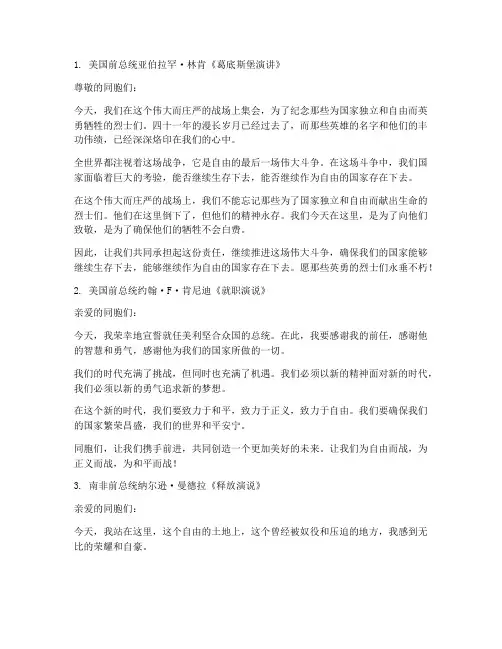
1. 美国前总统亚伯拉罕·林肯《葛底斯堡演讲》尊敬的同胞们:今天,我们在这个伟大而庄严的战场上集会,为了纪念那些为国家独立和自由而英勇牺牲的烈士们。
四十一年的漫长岁月已经过去了,而那些英雄的名字和他们的丰功伟绩,已经深深烙印在我们的心中。
全世界都注视着这场战争,它是自由的最后一场伟大斗争。
在这场斗争中,我们国家面临着巨大的考验,能否继续生存下去,能否继续作为自由的国家存在下去。
在这个伟大而庄严的战场上,我们不能忘记那些为了国家独立和自由而献出生命的烈士们。
他们在这里倒下了,但他们的精神永存。
我们今天在这里,是为了向他们致敬,是为了确保他们的牺牲不会白费。
因此,让我们共同承担起这份责任,继续推进这场伟大斗争,确保我们的国家能够继续生存下去,能够继续作为自由的国家存在下去。
愿那些英勇的烈士们永垂不朽!2. 美国前总统约翰·F·肯尼迪《就职演说》亲爱的同胞们:今天,我荣幸地宣誓就任美利坚合众国的总统。
在此,我要感谢我的前任,感谢他的智慧和勇气,感谢他为我们的国家所做的一切。
我们的时代充满了挑战,但同时也充满了机遇。
我们必须以新的精神面对新的时代,我们必须以新的勇气追求新的梦想。
在这个新的时代,我们要致力于和平,致力于正义,致力于自由。
我们要确保我们的国家繁荣昌盛,我们的世界和平安宁。
同胞们,让我们携手前进,共同创造一个更加美好的未来。
让我们为自由而战,为正义而战,为和平而战!3. 南非前总统纳尔逊·曼德拉《释放演说》亲爱的同胞们:今天,我站在这里,这个自由的土地上,这个曾经被奴役和压迫的地方,我感到无比的荣耀和自豪。
四年的铁窗生涯,让我更加深刻地理解了自由的意义。
自由不仅仅是一种权利,更是一种责任。
今天,我们终于走出了黑暗的牢笼,迎来了新的黎明。
我们将以和平、团结和民主的方式,建设一个没有种族歧视,没有压迫,没有恐惧的国家。
同胞们,让我们团结起来,为了我们的国家,为了我们的未来,为了自由,为了和平,共同奋斗!4. 美国民权领袖马丁·路德·金《我有一个梦想》亲爱的同胞们:今天,我站在这里,面对你们,面对这个伟大的国家,我要说,我有一个梦想。
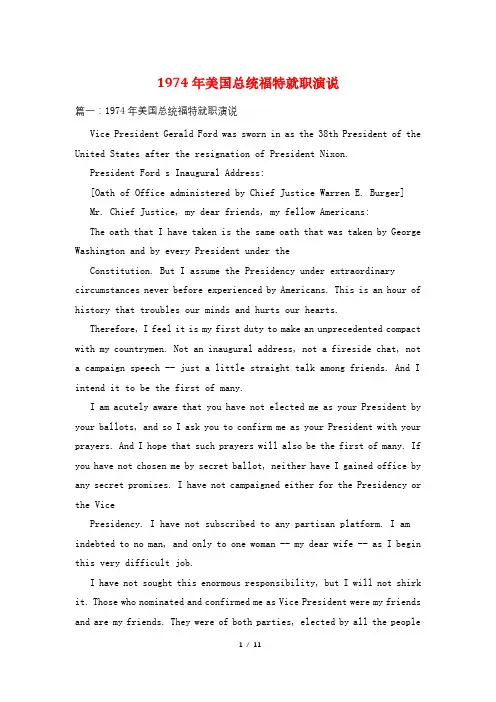
1974年美国总统福特就职演说篇一:1974年美国总统福特就职演说Vice President Gerald Ford was sworn in as the 38th President of the United States after the resignation of President Nixon.President Ford s Inaugural Address:[Oath of Office administered by Chief Justice Warren E. Burger]Mr. Chief Justice, my dear friends, my fellow Americans:The oath that I have taken is the same oath that was taken by George Washington and by every President under theConstitution. But I assume the Presidency under extraordinary circumstances never before experienced by Americans. This is an hour of history that troubles our minds and hurts our hearts.Therefore, I feel it is my first duty to make an unprecedented compact with my countrymen. Not an inaugural address, not a fireside chat, not a campaign speech -- just a little straight talk among friends. And I intend it to be the first of many.I am acutely aware that you have not elected me as your President by your ballots, and so I ask you to confirm me as your President with your prayers. And I hope that such prayers will also be the first of many. If you have not chosen me by secret ballot, neither have I gained office by any secret promises. I have not campaigned either for the Presidency or the VicePresidency. I have not subscribed to any partisan platform. I am indebted to no man, and only to one woman -- my dear wife -- as I begin this very difficult job.I have not sought this enormous responsibility, but I will not shirk it. Those who nominated and confirmed me as Vice President were my friends and are my friends. They were of both parties, elected by all the peopleand acting under the Constitution in their name. It is only fitting then that I should pledge to them and to you that I will be the President of all the people.Thomas Jefferson said the people are the only sure reliance for the preservation of our liberty. And down the years, Abraham Lincoln renewed this American article of faith asking, Is there any better way or equal hope in the world?I intend, on Monday next, to request of the Speaker of the House of Representatives and the President pro tempore of the Senate the privilege of appearing before the Congress to share with my former colleagues and with you, the American people, my views on the priority business of the Nation and to solicit your views and their views. And may I say to the Speaker and the others, if I could meet with you right after these remarks, I would appreciate it.Even though this is late in an election year, there is no way we can go forward except together and no way anybody can win except by serving the people s urgent needs. We cannot stand still or slip backwards. We must go forward now together.To the peoples and the governments of all friendly nations, and I hope that could encompass the whole world, I pledge an uninterrupted and sincere search for peace. America will remain strong and united, but its strength will remain dedicated to the safety and sanity of the entire family of man, as well as to our own precious freedom. I believe that truth is the glue that holds government together, not only our Government but civilization itself. That bond, though stained, is unbroken at home and abroad.In all my public and private acts as your President, I expect to follow my instincts of openness and candor with full confidence that honesty is always the best policy in the end.My fellow Americans, our long national nightmare is over.Our Constitution works. Our great Republic is a government of laws and not of men. Here, the people rule. But there is a higher Power, by whatever name we honor Him, who ordains not only righteousness but love, not only justice but mercy. As we bind up the internal wounds of Watergate, more painful and more poisonous than those of foreign wars, let us restore the golden rule to our political process, and let brotherly love purge our hearts of suspicion and of hate.In the beginning, I asked you to pray for me. Before closing, I ask again your prayers, for Richard Nixon and for his family. May our former President, who brought peace to millions, find it for himself. May God bless and comfort his wonderful wife and daughters, whose love and loyalty will forever be a shining legacy to all who bear the lonely burdens of the White House. I can only guess at those burdens, although I have witnessed at close hand the tragedies that befell three Presidents and the lesser trials of others.With all the strength and all the good sense I have gained from life, with all the confidence of my family, my friends, and my dedicated staff impart to me, and with the good will of countless Americans I have encountered in recent visits to 40 States, I now solemnly reaffirm my promise I made to you last December 6: To uphold the Constitution; to do what is right as God gives me to see the right; and to do the very best I can for America.God helping me, I will not let you down.Thank you.原文链接:/thread-2841-1-1.html篇二:美国历届总统1865年4月15日,安德鲁·约翰逊总统:因为总统死亡,约翰逊是第一位由总检察长带领宣誓就任总统的副总统。
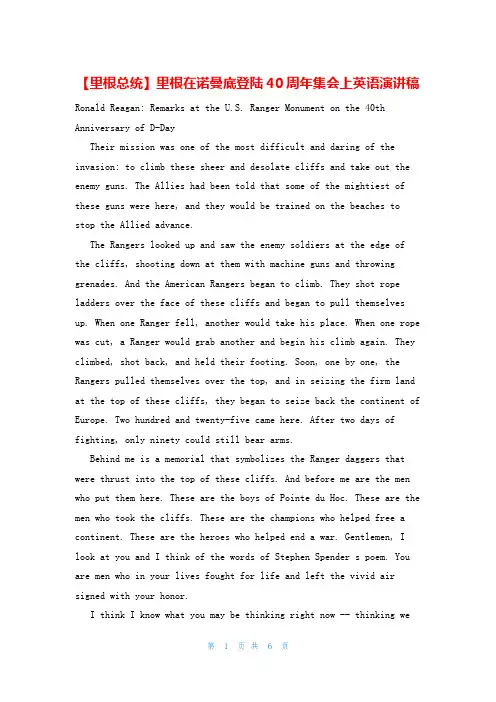
【里根总统】里根在诺曼底登陆40周年集会上英语演讲稿Ronald Reagan: Remarks at the U.S. Ranger Monument on the 40th Anniversary of D-DayTheir mission was one of the most difficult and daring of the invasion: to climb these sheer and desolate cliffs and take out the enemy guns. The Allies had been told that some of the mightiest of these guns were here, and they would be trained on the beaches to stop the Allied advance.The Rangers looked up and saw the enemy soldiers at the edge of the cliffs, shooting down at them with machine guns and throwing grenades. And the American Rangers began to climb. They shot rope ladders over the face of these cliffs and began to pull themselves up. When one Ranger fell, another would take his place. When one rope was cut, a Ranger would grab another and begin his climb again. They climbed, shot back, and held their footing. Soon, one by one, the Rangers pulled themselves over the top, and in seizing the firm land at the top of these cliffs, they began to seize back the continent of Europe. Two hundred and twenty-five came here. After two days of fighting, only ninety could still bear arms.Behind me is a memorial that symbolizes the Ranger daggers that were thrust into the top of these cliffs. And before me are the men who put them here. These are the boys of Pointe du Hoc. These are the men who took the cliffs. These are the champions who helped free a continent. These are the heroes who helped end a war. Gentlemen, I look at you and I think of the words of Stephen Spender s poem. You are men who in your lives fought for life and left the vivid air signed with your honor.I think I know what you may be thinking right now -- thinking wewere just part of a bigger effort; everyone was brave that day. Well, everyone was. You remember the story of Bill Millin of the 51st Highlanders Forty years ago today, British troops were pinned down near a bridge, waiting desperately for help. Suddenly, they heard the sound of bagpipes, and some thought they were dreaming. Well, they weren t. They looked up and saw Bill Millin with his bagpipes, leading the reinforcements and ignoring the smack of the bullets into the ground around him.Lord Lovat was with him -- Lord Lovat of Scotland, who calmly announced when he got to the bridge, Sorry, I m a few minutes late, as if he d been delayed by a traffic jam, when in truth he d just come from the bloody fighting on Sword Beach, which he and his men had just taken.There was the impossible valor of the Poles, who threw themselves between the enemy and the rest of Europe as the invasion took hold; and the unsurpassed courage of the Canadians who had already seen the horrors of war on this coast. They knew what awaited them there, but they would not be deterred. And once they hit Juno Beach, they never looked back.All of these men were part of a roll call of honor with names that spoke of a pride as bright as the colors they bore; The Royal Winnipeg Rifles, Poland s 24th Lancers, the Royal Scots Fusiliers, the Screaming Eagles, the Yeomen of England s armored divisions, the forces of Free France, the Coast Guard s Matchbox Fleet, and you, the American Rangers.Forty summers have passed since the battle that you fought here. You were young the day you took these cliffs; some of you were hardly more than boys, with the deepest joys of life before you. Yet, yourisked everything here. Why Why did you do it What impelled you to put aside the instinct for self-preservation and risk your lives to take these cliffs What inspired all the men of the armies that met here We look at you, and somehow we know the answer. It was faith and belief. It was loyalty and love.The men of Normandy had faith that what they were doing was right, faith that they fought for all humanity, faith that a just God would grant them mercy on this beachhead, or on the next. It was the deep knowledge -- and pray God we have not lost it -- that there is a profound moral difference between the use of force for liberation and the use of force for conquest. You were here to liberate, not to conquer, and so you and those others did not doubt your cause. And you were right not to doubt.You all knew that some things are worth dying for. One s countryis worth dying for, and democracy is worth dying for, because it s the most deeply honorable form of government ever devised by man. All of you loved liberty. All of you were willing to fight tyranny, and you knew the people of your countries were behind you.The Americans who fought here that morning knew word of the invasion was spreading through the darkness back home. They fought -- or felt in their hearts, though they couldn t know in fact, that in Georgia they were filling the churches at 4:00 am. In Kansas they were kneeling on their porches and praying, and in Philadelphia they were ringing the Liberty Bell.Something else helped the men of D-day; their rock-hard beliefthat Providence would have a great hand in the events that would unfold here; that God was an ally in this great cause. And so, the night before the invasion, when Colonel Wolverton asked his parachutetroops to kneel with him in prayer, he told them: Do not bow your heads, but look up so you can see God and ask His blessing in what we re about to do. Also, that night, General Matthew Ridgway on his cot, listening in the darkness for the promise God made to Joshua: I will not fail thee nor forsake thee.These are the things that impelled them; these are the things that shaped the unity of the Allies.When the war was over, there were lives to be rebuilt and governments to be returned to the people. There were nations to be reborn. Above all, there was a new peace to be assured. These were huge and daunting tasks. But the Allies summoned strength from the faith, belief, loyalty, and love of those who fell here. They rebuilt a new Europe together. There was first a great reconciliation among those who had been enemies, all of whom had suffered so greatly. The United States did its part, creating the Marshall Plan to helprebuild our allies and our former enemies. The Marshall Plan led to the Atlantic alliance -- a great alliance that serves to this day as our shield for freedom, for prosperity, and for peace.In spite of our great efforts and successes, not all that followed the end of the war was happy or planned. Some liberated countries were lost. The great sadness of this loss echoes down to our own time in the streets of Warsaw, Prague, and East Berlin. The Soviet troops that came to the center of this continent did not leave when peace came. They re still there, uninvited, unwanted, unyielding, almost forty years after the war. Because of this, allied forces still stand on this continent. Today, as forty years ago, our armies are here for only one purpose: to protect and defend democracy. The onlyterritories we hold are memorials like this one and graveyards whereour heroes rest.We in America have learned bitter lessons from two world wars. It is better to be here ready to protect the peace, than to take blind shelter across the sea, rushing to respond only after freedom is lost. We ve learned that isolationism never was and never will be an acceptable response to tyrannical governments with an expansionist intent. But we try always to be prepared for peace, prepared to deter aggression, prepared to negotiate the reduction of arms, and yes, prepared to reach out again in the spirit of reconciliation. In truth, there is no reconciliation we would welcome more than a reconciliation with the Soviet Union, so, together, we can lessen the risks of war, now and forever.It s fitting to remember here the great losses also suffered by the Russian people during World War II: 20 million perished, aterrible price that testifies to all the world the necessity of ending war. I tell you from my heart that we in the United States do not want war. We want to wipe from the face of the earth the terrible weapons that man now has in his hands. And I tell you, we are ready to seize that beachhead. We look for some sign from the Soviet Union that they are willing to move forward, that they share our desire and love for peace, and that they will give up the ways of conquest. There must be a changing there that will allow us to turn our hope into action.We will pray forever that someday that changing will come. But for now, particularly today, it is good and fitting to renew our commitment to each other, to our freedom, and to the alliance that protects it.We re bound today by what bound us 40 years ago, the sameloyalties, traditions, and beliefs. We re bound by reality. The strength of America s allies is vital to the United States, and the American security guarantee is essential to the continued freedom of Europe s democracies. We were with you then; we are with you now. Your hopes are our hopes, and your destiny is our destiny.Here, in this place where the West held together, let us make a vow to our dead. Let us show them by our actions that we understand what they died for. Let our actions say to them the words for which Matthew Ridgway listened: I will not fail thee nor forsake thee. Strengthened by their courage and heartened by their valor and borne by their memory, let us continue to stand for the ideals for which they lived and died.Thank you very much, and God bless you all.。
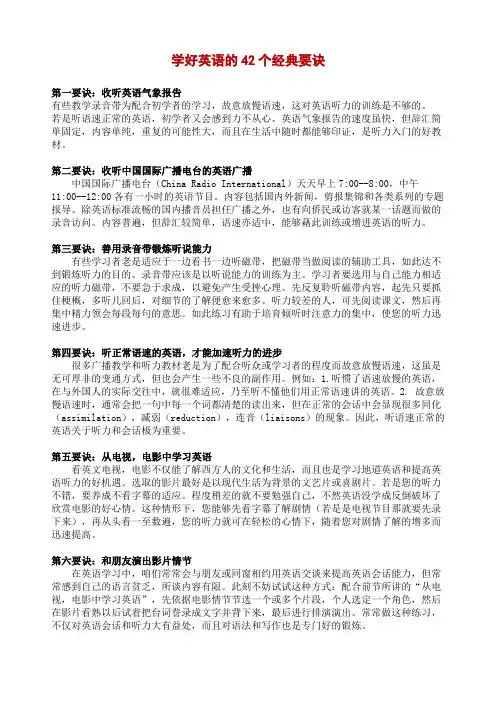
学好英语的42个经典要诀第一要诀:收听英语气象报告有些教学录音带为配合初学者的学习,故意放慢语速,这对英语听力的训练是不够的。
若是听语速正常的英语,初学者又会感到力不从心。
英语气象报告的速度虽快,但辞汇简单固定,内容单纯,重复的可能性大,而且在生活中随时都能够印证,是听力入门的好教材。
第二要诀:收听中国国际广播电台的英语广播中国国际广播电台(China Radio International)天天早上7:00--8:00,中午11:00--12:00各有一小时的英语节目。
内容包括国内外新闻,剪报集锦和各类系列的专题报导。
除英语标准流畅的国内播音员担任广播之外,也有向侨民或访客就某一话题而做的录音访问。
内容普遍,但辞汇较简单,语速亦适中,能够藉此训练或增进英语的听力。
第三要诀:善用录音带锻炼听说能力有些学习者老是适应于一边看书一边听磁带,把磁带当做阅读的辅助工具,如此达不到锻炼听力的目的。
录音带应该是以听说能力的训练为主。
学习者要选用与自己能力相适应的听力磁带,不要急于求成,以避免产生受挫心理。
先反复聆听磁带内容,起先只要抓住梗概,多听几回后,对细节的了解便愈来愈多。
听力较差的人,可先阅读课文,然后再集中精力领会每段每句的意思。
如此练习有助于培育倾听时注意力的集中,使您的听力迅速进步。
第四要诀:听正常语速的英语,才能加速听力的进步很多广播教学和听力教材老是为了配合听众或学习者的程度而故意放慢语速,这虽是无可厚非的变通方式,但也会产生一些不良的副作用。
例如:1.听惯了语速放慢的英语,在与外国人的实际交往中,就很难适应,乃至听不懂他们用正常语速讲的英语。
2. 故意放慢语速时,通常会把一句中每一个词都清楚的读出来,但在正常的会话中会显现很多同化(assimilation),减弱(reduction),连音(liaisons)的现象。
因此,听语速正常的英语关于听力和会话极为重要。
第五要诀:从电视,电影中学习英语看英文电视,电影不仅能了解西方人的文化和生活,而且也是学习地道英语和提高英语听力的好机遇。
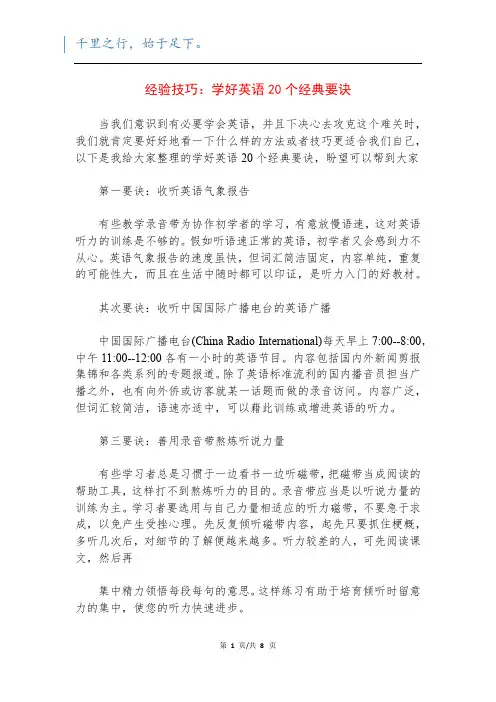
经验技巧:学好英语20个经典要诀当我们意识到有必要学会英语,并且下决心去攻克这个难关时,我们就肯定要好好地看一下什么样的方法或者技巧更适合我们自己,以下是我给大家整理的学好英语20个经典要诀,盼望可以帮到大家第一要诀:收听英语气象报告有些教学录音带为协作初学者的学习,有意放慢语速,这对英语听力的训练是不够的。
假如听语速正常的英语,初学者又会感到力不从心。
英语气象报告的速度虽快,但词汇简洁固定,内容单纯,重复的可能性大,而且在生活中随时都可以印证,是听力入门的好教材。
其次要诀:收听中国国际广播电台的英语广播中国国际广播电台(China Radio International)每天早上7:00--8:00,中午11:00--12:00各有一小时的英语节目。
内容包括国内外新闻剪报集锦和各类系列的专题报道。
除了英语标准流利的国内播音员担当广播之外,也有向外侨或访客就某一话题而做的录音访问。
内容广泛,但词汇较简洁,语速亦适中,可以藉此训练或增进英语的听力。
第三要诀:善用录音带熬炼听说力量有些学习者总是习惯于一边看书一边听磁带,把磁带当成阅读的帮助工具,这样打不到熬炼听力的目的。
录音带应当是以听说力量的训练为主。
学习者要选用与自己力量相适应的听力磁带,不要急于求成,以免产生受挫心理。
先反复倾听磁带内容,起先只要抓住梗概,多听几次后,对细节的了解便越来越多。
听力较差的人,可先阅读课文,然后再集中精力领悟每段每句的意思。
这样练习有助于培育倾听时留意力的集中,使您的听力快速进步。
第四要诀:听正常语速的英语,才能加速听力的进步许多广播教学和听力教材总是为了协作听众或学习者的程度而有意放慢语速,这虽是无可厚非的变通方法,但也会产生一些不良的副作用。
例如:1.听惯了语速放慢的英语,在与外国人的实际交往中,就很难适应,甚至听不懂他们用正常语速讲的英语。
2. 有意放慢语速时,通常会把一句中每个词都清晰的读出来,但在正常的会话中会消失许多同化assimilation),减弱(reduction),连音(liaision)的现象。
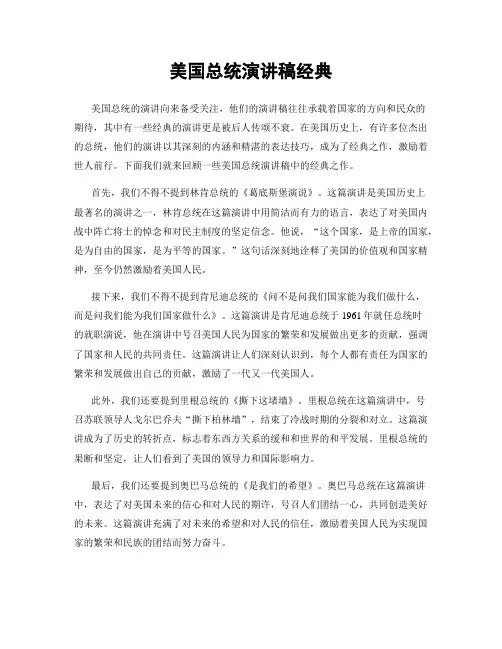
美国总统演讲稿经典美国总统的演讲向来备受关注,他们的演讲稿往往承载着国家的方向和民众的期待,其中有一些经典的演讲更是被后人传颂不衰。
在美国历史上,有许多位杰出的总统,他们的演讲以其深刻的内涵和精湛的表达技巧,成为了经典之作,激励着世人前行。
下面我们就来回顾一些美国总统演讲稿中的经典之作。
首先,我们不得不提到林肯总统的《葛底斯堡演说》。
这篇演讲是美国历史上最著名的演讲之一,林肯总统在这篇演讲中用简洁而有力的语言,表达了对美国内战中阵亡将士的悼念和对民主制度的坚定信念。
他说,“这个国家,是上帝的国家,是为自由的国家,是为平等的国家。
”这句话深刻地诠释了美国的价值观和国家精神,至今仍然激励着美国人民。
接下来,我们不得不提到肯尼迪总统的《问不是问我们国家能为我们做什么,而是问我们能为我们国家做什么》。
这篇演讲是肯尼迪总统于1961年就任总统时的就职演说,他在演讲中号召美国人民为国家的繁荣和发展做出更多的贡献,强调了国家和人民的共同责任。
这篇演讲让人们深刻认识到,每个人都有责任为国家的繁荣和发展做出自己的贡献,激励了一代又一代美国人。
此外,我们还要提到里根总统的《撕下这堵墙》。
里根总统在这篇演讲中,号召苏联领导人戈尔巴乔夫“撕下柏林墙”,结束了冷战时期的分裂和对立。
这篇演讲成为了历史的转折点,标志着东西方关系的缓和和世界的和平发展。
里根总统的果断和坚定,让人们看到了美国的领导力和国际影响力。
最后,我们还要提到奥巴马总统的《是我们的希望》。
奥巴马总统在这篇演讲中,表达了对美国未来的信心和对人民的期许,号召人们团结一心,共同创造美好的未来。
这篇演讲充满了对未来的希望和对人民的信任,激励着美国人民为实现国家的繁荣和民族的团结而努力奋斗。
总的来说,美国总统的演讲稿中充满了对国家和人民的热爱,他们用精湛的表达技巧和深刻的内涵,激励着世人前行。
这些经典的演讲,不仅是美国历史的重要组成部分,更是世界文化的宝贵遗产。
让我们铭记这些经典之作,传承这份热爱和信念,共同创造美好的未来。
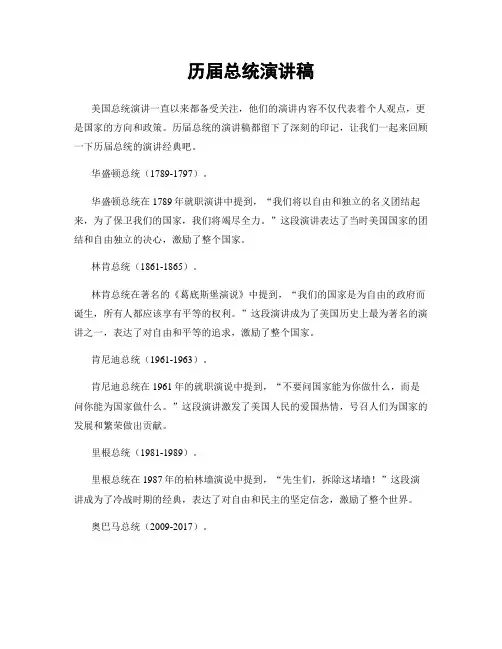
历届总统演讲稿美国总统演讲一直以来都备受关注,他们的演讲内容不仅代表着个人观点,更是国家的方向和政策。
历届总统的演讲稿都留下了深刻的印记,让我们一起来回顾一下历届总统的演讲经典吧。
华盛顿总统(1789-1797)。
华盛顿总统在1789年就职演讲中提到,“我们将以自由和独立的名义团结起来,为了保卫我们的国家,我们将竭尽全力。
”这段演讲表达了当时美国国家的团结和自由独立的决心,激励了整个国家。
林肯总统(1861-1865)。
林肯总统在著名的《葛底斯堡演说》中提到,“我们的国家是为自由的政府而诞生,所有人都应该享有平等的权利。
”这段演讲成为了美国历史上最为著名的演讲之一,表达了对自由和平等的追求,激励了整个国家。
肯尼迪总统(1961-1963)。
肯尼迪总统在1961年的就职演说中提到,“不要问国家能为你做什么,而是问你能为国家做什么。
”这段演讲激发了美国人民的爱国热情,号召人们为国家的发展和繁荣做出贡献。
里根总统(1981-1989)。
里根总统在1987年的柏林墙演说中提到,“先生们,拆除这堵墙!”这段演讲成为了冷战时期的经典,表达了对自由和民主的坚定信念,激励了整个世界。
奥巴马总统(2009-2017)。
奥巴马总统在2008年的胜选演说中提到,“这不仅仅是我胜利的一天,而是美国的胜利的一天。
”这段演讲充满了希望和改变的力量,激励了整个国家,也影响了整个世界。
以上是历届美国总统的一些经典演讲,这些演讲不仅代表了当时的国家形势和政策,更是激励了整个国家和世界。
总统演讲的力量是巨大的,它可以激发人们的爱国热情,也可以改变整个世界的走向。
让我们铭记这些经典演讲,传承其中的力量,为美好的未来努力奋斗!。
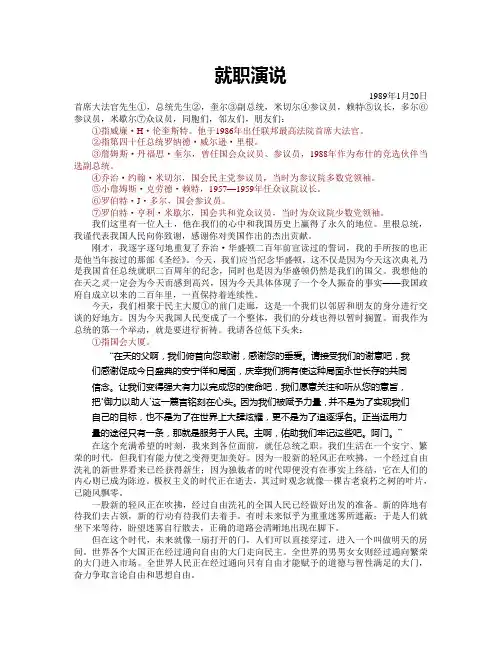
就职演说1989年1月20日首席大法官先生①,总统先生②,奎尔③副总统,米切尔④参议员,赖特⑤议长,多尔⑥参议员,米歇尔⑦众议员,同胞们,邻友们,朋友们:①指威廉·H·伦奎斯特。
他于1986年出任联邦最高法院首席大法官。
②指第四十任总统罗纳德·威尔逊·里根。
③詹姆斯·丹福思·奎尔,曾任国会众议员、参议员,1988年作为布什的竞选伙伴当选副总统。
④乔治·约翰·米切尔,国会民主党参议员,当时为参议院多数党领袖。
⑤小詹姆斯·克劳德·赖特,1957—1959年任众议院议长。
⑥罗伯特·J·多尔,国会参议员。
⑦罗伯特·亨利·米歇尔,国会共和党众议员,当时为众议院少数党领袖。
我们这里有一位人士,他在我们的心中和我国历史上赢得了永久的地位。
里根总统,我谨代表我国人民向你致谢,感谢你对美国作出的杰出贡献。
刚才,我逐字逐句地重复了乔治·华盛顿二百年前宣读过的誓词,我的手所按的也正是他当年按过的那部《圣经》。
今天,我们应当纪念华盛顿,这不仅是因为今天这次典礼乃是我国首任总统就职二百周年的纪念,同时也是因为华盛顿仍然是我们的国父。
我想他的在天之灵一定会为今天而感到高兴,因为今天具体体现了一个令人振奋的事实——我国政府自成立以来的二百年里,一直保持着连续性。
今天,我们相聚于民主大厦①的前门走廊,这是一个我们以邻居和朋友的身分进行交谈的好地方。
因为今天我国人民变成了一个整体,我们的分歧也得以暂时搁置。
而我作为总统的第一个举动,就是要进行祈祷。
我请各位低下头来:①指国会大厦。
“在天的父啊,我们俯首向您致谢,感谢您的垂爱。
请接受我们的谢意吧,我们感谢促成今日盛典的安宁徉和局面,庆幸我们拥有使这种局面永世长存的共同信念。
让我们变得强大有力以完成您的使命吧,我们愿意关注和听从您的意旨,把…御力以助人‟这一蔑言铭刻在心头。
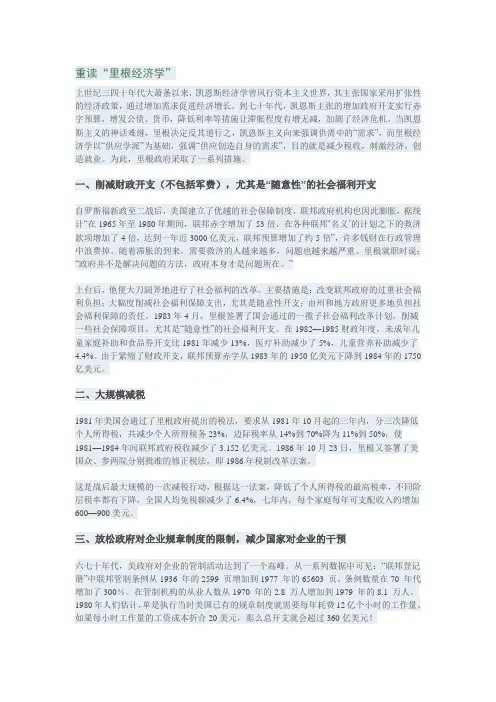
重读“里根经济学”上世纪三四十年代大萧条以来,凯恩斯经济学曾风行资本主义世界,其主张国家采用扩张性的经济政策,通过增加需求促进经济增长。
到七十年代,凯恩斯主张的增加政府开支实行赤字预算,增发公债、货币,降低利率等措施让滞胀程度有增无减,加剧了经济危机。
当凯恩斯主义的神话难继,里根决定反其道行之,凯恩斯主义向来强调供需中的“需求”,而里根经济学以“供应学派”为基础,强调“供应创造自身的需求”,目的就是减少税收,刺激经济,创造就业。
为此,里根政府采取了一系列措施。
一、削减财政开支(不包括军费),尤其是“随意性”的社会福利开支自罗斯福新政至二战后,美国建立了优越的社会保障制度,联邦政府机构也因此膨胀,据统计“在1965年至1980年期间,联邦赤字增加了53倍,在各种联邦…名义‟的计划之下的救济款项增加了4倍,达到一年近3000亿美元,联邦预算增加了约5倍”,许多钱财在行政管理中浪费掉。
随着滞胀的到来,需要救济的人越来越多,问题也越来越严重。
里根就职时说:“政府并不是解决问题的方法,政府本身才是问题所在。
”上台后,他便大刀阔斧地进行了社会福利的改革。
主要措施是:改变联邦政府的过重社会福利负担;大幅度削减社会福利保障支出,尤其是随意性开支;由州和地方政府更多地负担社会福利保障的责任。
1983年4月,里根签署了国会通过的一揽子社会福利改革计划,削减一些社会保障项目,尤其是“随意性”的社会福利开支。
在1982—1985财政年度,未成年儿童家庭补助和食品券开支比1981年减少13%,医疗补助减少了5%,儿童营养补助减少了4.4%。
由于紧缩了财政开支,联邦预算赤字从1983年的1950亿美元下降到1984年的1750亿美元。
二、大规模减税1981年美国会通过了里根政府提出的税法,要求从1981年10月起的三年内,分三次降低个人所得税,共减少个人所得税务23%,边际税率从14%到70%降为11%到50%;使1981—1984年间联邦政府税收减少了3.152亿美元。
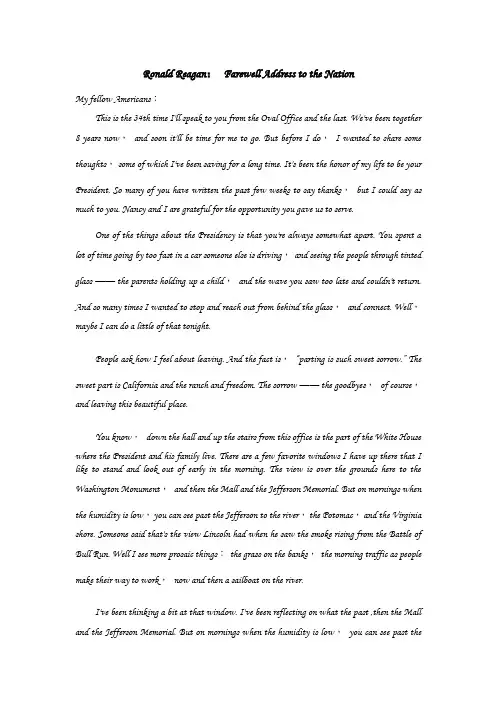
Ronald Reagan:Farewell Address to the NationMy fellow Americans:This is the 34th time I'll speak to you from the Oval Office and the last. We've been together 8 years now,and soon it'll be time for me to go. But before I do,I wanted to share somethoughts,some of which I've been saving for a long time. It's been the honor of my life to be yourPresident. So many of you have written the past few weeks to say thanks,but I could say as much to you. Nancy and I are grateful for the opportunity you gave us to serve.One of the things about the Presidency is that you're always somewhat apart. You spent a lot of time going by too fast in a car someone else is driving,and seeing the people through tintedglass —— the parents holding up a child,and the wave you saw too late and couldn't return.And so many times I wanted to stop and reach out from behind the glass,and connect. Well,maybe I can do a little of that tonight.People ask how I feel about leaving. And the fact is,“parting is such sweet sorrow.” Thesweet part is California and the ranch and freedom. The sorrow —— the goodbyes,of course,and leaving this beautiful place.You know,down the hall and up the stairs from this office is the part of the White House where the President and his family live. There are a few favorite windows I have up there that I like to stand and look out of early in the morning. The view is over the grounds here to the Washington Monument,and then the Mall and the Jefferson Memorial. But on mornings whenthe humidity is low,you can see past the Jefferson to the river,the Potomac,and the Virginia shore. Someone said that's the view Lincoln had when he saw the smoke rising from the Battle of Bull Run. Well I see more prosaic things:the grass on the banks,the morning traffic as people make their way to work,now and then a sailboat on the river.I've been thinking a bit at that window. I've been reflecting on what the past ,then the Mall and the Jefferson Memorial. But on mornings when the humidity is low,you can see past theJefferson to the river,the Potomac,and the Virginia shore. Someone said that's the view Lincoln had when he saw the smoke rising from the Battle of Bull Run. Well I see more prosaicthings:the grass on the banks,the morning traffic as people make their way to work,now and then a sailboat on the river.I've been thinking a bit at that window. I've been reflecting on what the past 8 years have meant and mean. And the image that comes to mind like a refrain is a nautical one —— a smallstory about a big ship,and a refugee,and a sailor. It was back in the early eighties,at the height of the boat people. And the sailor was hard at work on the carrier Midway,which was patrolling the South China Sea. The sailor,like most American servicemen,was young,smart,and fiercely observant. The crew spied on the horizon a leaky little boat. And crammed inside were refugees from Indochina hoping to get to America. The Midway sent a small launch to bring them to the ship and safety. As the refugees made their way through the choppy seas,one spied the sailor on deck,and stood up,and called out to him. He yelled,“Hello,American sailor. Hello,freedom man.”A small moment with a big meaning, a moment the sailor,who wrote it in a letter,couldn't get out of his mind. And,when I saw it,neither could I. Because that's what it has to —— it was to be an American in the 1980's. We stood,again,for freedom. I know we always have,but in the past few years the world again —— and in a way,we ourselves ——rediscovered it. It's been quite a journey this decade,and we held together through some stormy seas. And at the end,together,we're reaching our destination.The fact is,from Grenada to the Washington and Moscow summits,from the recession of '81 to '82,to the expansion that began in late '82 and continues to this day,we've made a difference. The way I see it,there were two great triumphs,two things that I'm proudest of. One is the economic recovery,in which the people of America created —— and filled —— 19million new jobs. The other is the recovery of our morale. America is respected again in the world and looked to for leadership.Something that happened to me a few years ago reflects some of this. It was back in 1981,and I was attending my first big economic summit,which was held that year in Canada. The meeting place rotates among the member countries. The opening meeting was a formal dinner for the heads of government of the seven industrialized nations. Well I sat there like the new kid in school and listened,and it was all Francois this and Helmut that. They dropped titles and spoke to one another on a first-name basis. Well,at one point I sort of leaned in and said,“My name's Ron.” Well,in that same year,we began the actions we felt would ignite an economic comeback —— cut taxes and regulation,started to cut spending. And soon the recovery began..Two years later,another economic summit with pretty much the same cast. At the big opening meeting we all got together,and all of a sudden,just for a moment,I saw that everyone was just sitting there looking at me. And then one of them broke the silence. “Tell us about the American miracle,” he said.Well,back in 1980,when I was running for President,it was all so different. Some pundits said our programs would result in catastrophe. Our views on foreign affairs would cause war. Our plans for the economy would cause inflation to soar and bring about economic collapse. I even remember one highly respected economist saying,back in 1982,that “The engines ofeconomic growth have shut down here,and they're likely to stay that way for years to come.” Well,he and the other opinion leaders were wrong. The fact is what they call “radical” was really “right.” What they called “dangerous” was just “desperately needed.”And in all of that time I won a nickname,“The Great Communicator.” But I never thought it was my style or the words I used that made a difference:it was the content. I wasn't a great communicator,but I communicated great things,and they didn't spring full bloom from mybrow,they came from the heart of a great nation —— from our experience,our wisdom,and our belief in the principles that have guided us for two centuries. They called it the “Reagan Revolutio n.” Well,I'll accept that,but for me it always seemed more like the great rediscovery,a rediscovery of our values and our common sense.Common sense told us that when you put a big tax on something,the people will produce less of it. So,we cut the people's tax rates,and the people produced more than ever before. The economy bloomed like a plant that had been cut back and could now grow quicker and stronger. Our economic program brought about the longest peacetime expansion in our history:real family income up,the poverty rate down,entrepreneurship booming,and an explosion in research and new technology. We're exporting more than ever because American industry became more competitive. And at the same time,we summoned the national will to knock down protectionist walls abroad instead of erecting them at home.Common sense also told us that to preserve the peace,we'd have to become strong again after years of weakness and confusion. So,we rebuilt our defenses,and this New Year we toasted the new peacefulness around the globe. Not only have the superpowers actually begun to reduce their stockpiles of nuclear weapons —— and hope for even more progress is bright ——but the regional conflicts that rack the globe are also beginning to cease. The Persian Gulf is no longer a war zone. The Soviets are leaving Afghanistan. The Vietnamese are preparing to pull out of Cambodia,and an American-mediated accord will soon send 50,000 Cuban troops home from Angola.The lesson of all this was,of course,that because we're a great nation,our challenges seem complex. It will always be this way. But as long as we remember our first principles and believe in ourselves,the future will always be ours. And something else we learned:Once you begin a great movement,there's no telling where it'll end. We meant to change a nation,and instead,we changed a world.Countries across the globe are turning to free markets and free speech and turning away fromthe ideologies of the past. For them,the great rediscovery of the 1980's has been that,lo and behold,the moral way of government is the practical way of government:Democracy,the profoundly good,is also the profoundly productive.When you've got to the point when you can celebrate the anniversaries of your 39th birthday,you can sit back sometimes,review your life,and see it flowing before you. For me there was a fork in the river,and it was right in the middle of my life. I never meant to go into politics. It wasn't my intention when I was young. But I was raised to believe you had to pay your way for the blessings bestowed on you. I was happy with my career in the entertainment world,but I ultimately went into politics because I wanted to protect something precious.Ours was the first revolution in the history of mankind that truly reversed the course of government,and with three little words:“We the People.” “We the People” tell the government what to do;it doesn't tell us. “We the People” are the driver;the government is the car,and we decide where it should go,and by what route,and how fast. Almost all the world's constitutions are documents in which governments tell the people what their privileges are. Our Constitution is a document in which “We the People” tell the government what it is allowed to do. “We the People” are free. This belief has been the underlying basis for everything I've tried to do these past 8 years.But back in the 1960's,when I began,it seemed to me that we'd begun reversing the order of things —— that through more and more rules and regulations and confiscatory taxes,the government was taking more of our money,more of our options,and more of our freedom. I went into politics in part to put up my hand and say,“Stop.” I was a citizen politician,and it seemed the right thing for a citizen to do.I think we have stopped a lot of what needed stopping. And I hope we have once again reminded people that man is not free unless government is limited. There's a clear cause and effecthere that is as neat and predictable as a law of physics:“As government expands,liberty contracts.”Nothing is less free than pure communism —— and yet we have,the past few years,forged a satisfying new closeness with the Soviet Union. I've been asked if this isn't a gamble,and my answer is no because we're basing our actions not on words but deeds. The detente of this 1970's was based not on actions but promises. They'd promise to treat their own people and the people of the world better. But the gulag was still the gulag,and the state was still expansionist,and they still waged proxy wars in Africa,Asia,and Latin America. Well,this time,so far,it's different. President Gorbachev has brought about some internal democratic reforms and begun the withdrawal from Afghanistan. He has also freed prisoners whose names I've given him every time we've met.But life has a way of reminding you of big things through small incidents. Once,during the heady days of the Moscow summit,Nancy and I decided to break off from the entourage one afternoon to visit the shops on Arbat Street —— that's a little street just off Moscow's main shopping area. Even though our visit was a surprise,every Russian there immediately recognized us and called out our names and reached for our hands. We were just about swept away by the warmth. You could almost feel the possibilities in all that joy. But within seconds,a KGB detail pushed their way toward us and began pushing and shoving the people in the crowd. It was an interesting moment. It reminded me that while the man on the street in the Soviet Union yearns for peace,the government is Communist. And those who run it are Communists,and that means we and they view such issues as freedom and human rights very differently.We must keep up our guard,but we must also continue to work together to lessen and eliminate tension and mistrust. My view is that President Gorbachev is different from previous Soviet leaders. I think he knows some of the things wrong with his society and is trying to fix them. We wish him well. And we'll continue to work to make sure that the Soviet Union that eventually emerges from this process is a less threatening one. What it all boils down to is this:Iwant the new closeness to continue. And it will,as long as we make it clear that we will continue to act in a certain way as long as they continue to act in a helpful manner. If and when they don't,at first pull your punches. If they persist,pull the plug. It's still trust but verify. It'sstill play,but cut the cards. It's still watch closely. And don't be afraid to see what you see.I've been asked if I have any regrets. Well,I do. The deficit is one. I've been talking a great deal about that lately,but tonight isn't for arguments,and I'm going to hold my tongue. But an observation:I've had my share of victories in the Congress,but what few people noticed is that I never won anything you didn't win for me. They never saw my troops;they never saw Reagan's regiments,the American people. You won every battle with every call you made and letter you wrote demanding action. Well,action is still needed. If we're to finish the job,Reagan's regiments will have to become the Bush brigades. Soon he'll be the Chief,and he'll need you every bit as much as I did.Finally,there is a great tradition of warnings in Presidential farewells,and I've got one that's been on my mind for some time. But oddly enough it starts with one of the things I'm proudest of in the past 8 years:the resurgence of national pride that I called,“The New Patriotism.” This national feeling is good,but it won't count for much,and it won't last unless it's grounded in thoughtfulness and knowledge.An informed patriotism is what we want. And are we doing a good enough job teaching our children what America is and what she represents in the long history of the world?Those of us who are over 35 or so years of age grew up in a different America. We were taught,very directly,what it means to be an American. And we absorbed,almost in the air,a love of country and an appreciation of its institutions. If you didn't get these things from your family you got them from the neighborhood,from the father down the street who fought in Korea or the family who lost someone at Anzio. Or you could get a sense of patriotism from school. And if all else failed you could get a sense of patriotism from the popular culture. The movies celebrated democratic values and implicitly reinforced the idea that America was special. TV was like that,too,through the mid-sixties.But now,we're about to enter the nineties,and some things have changed. Younger parents aren't sure that an unambivalent appreciation of America is the right thing to teach modern children. And as for those who create the popular culture,well-grounded patriotism is no longer the style. Our spirit is back,but we haven't reinstitutionalized it. We've got to do a better job of getting across that America is freedom —— freedom of speech,freedom of religion,freedom of enterprise. And freedom is special and rare. It's fragile;it needs production [protection].So,we've got to teach history based not on what's in fashion but what's important ——why the Pilgrims came here,who Jimmy Doolittle was,and what those 30 seconds over Tokyo meant. You know,4 years ago on the 40th anniversary of D-day,I read a letter from a young woman writing to her late father,who had fought on Omaha Beach. Her name was Lisa Zanatta Henn,and she said,“we will always remember,we will never forget what the boys of Normandy did.” Well,let's help her keep her word. If we forget what we did,we won't know who we are. I'm warning of an eradication of that ——of the American memory that could result,ultimately,in an erosion of the American spirit. Let's start with some basics:more attention to American history and a greater emphasis on civic ritual.And let me offer lesson number one about America:All great change in America begins at the dinner table. So,tomorrow night in the kitchen I hope the talking begins. And children,if your parents haven't been teaching you what it means to be an American,let 'em know and nail 'em on it. That would be a very American thing to do.And that's about all I have to say tonight,except for one thing. The past few days when I've been at that window upstairs,I've thought a bit of the 'shining city upon a hill.' The phrase comes from John Winthrop,who wrote it to describe the America he imagined. What heimagined was important because he was an early Pilgrim,an early freedom man. He journeyed here on what today we'd call a little wooden boat;and like the other Pilgrims,he was looking for a home that would be free. I've spoken of the shining city all my political life,but I don't know if I ever quite communicated what I saw when I said it. But in my mind it was a tall,proud city built on rocks stronger than oceans,windswept,God-blessed,and teeming with people of all kinds living in harmony and peace;a city with free ports that hummed with commerce and creativity. And if there had to be city walls,the walls had doors and the doors were open to anyone with the will and the heart to get here. That's how I saw it,and see it still.And how stands the city on this winter night?More prosperous,more secure,and happier than it was 8 years ago. But more than that:After 200 years,two centuries,she still stands strong and true on the granite ridge,and her glow has held steady no matter what storm. And she's still a beacon,still a magnet for all who must have freedom,for all the pilgrims from all the lost places who are hurtling through the darkness,toward home.We've done our part. And as I walk off into the city streets, a final word to the men and women of the Reagan Revolution,the men and women across America who for 8 years did the work that brought America back. My friends:We did it. We weren't just marking time. We made a difference. We made the city stronger;we made the city freer;and we left her in good hands. All in all,not bad —— not bad at all.And so,goodbye,God bless you,and God bless the United States of America.。
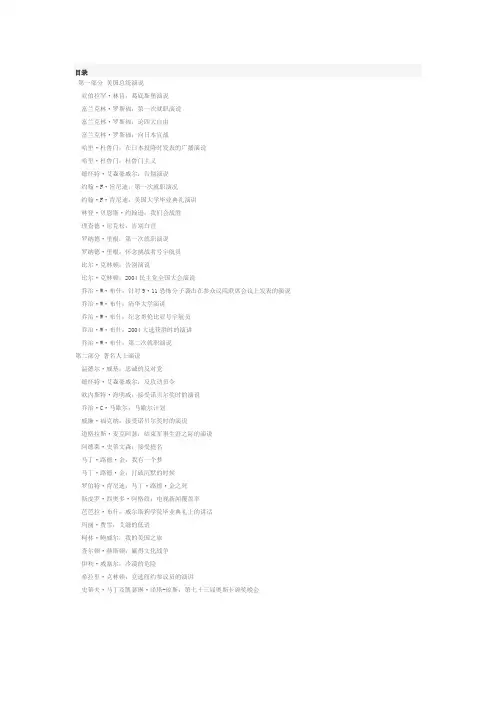
目录第一部分美国总统演说亚伯拉罕·林肯:葛底斯堡演说富兰克林·罗斯福:第一次就职演说富兰克林·罗斯福:论四大自由富兰克林·罗斯福:向日本宣战哈里·杜鲁门:在日本投降时发表的广播演说哈里·杜鲁门:杜鲁门主义德怀特·艾森豪威尔:告别演说约翰·F·旨尼迪:第一次就职演况约翰·F·肯尼迪:美国大学毕业典礼演讲林登·贝恩斯·约翰逊:我们会战胜理查德·尼克松:告别白宫罗纳德·里根:第一次就职演说罗纳德·里根:怀念挑战者号宇航员比尔·克林顿:告别演说比尔·克林顿:2004民主党全国大会演说乔治·W·布什:针对9·11恐怖分子袭击在参众议院联席会议上发表的演说乔治·W·布什:清华大学演讲乔治·W·布什:纪念哥伦比亚号宇航员乔治·W·布什:2004大选获胜时的演讲乔治·W·布什:第二次就职演说第二部分著名人士演说温德尔·威基:忠诚的反对党德怀特·艾森豪威尔:反攻动员令欧内斯特·海明威:接受诺贝尔奖时的演说乔治·C·马歇尔:马歇尔计划威廉·福克纳:接受诺贝尔奖时的演说道格拉斯·麦克阿瑟:结束军事生涯之际的演说阿德莱·史蒂文森:接受提名马丁·路德·金:我有一个梦马丁·路德·金:打破沉默的时候罗伯特·肯尼迪:马丁·路德·金之死斯皮罗·西奥多·阿格纽:电视新闻覆盖率芭芭拉·布什:威尔斯莉学院毕业典礼上的讲话玛丽·费雪:艾滋的低语柯林·鲍威尔:我的美国之旅查尔顿·赫斯顿:赢得文化战争伊利·威塞尔:冷漠的危险希拉里·克林顿:竞选纽约参议员的演讲史蒂夫·马丁及凯瑟琳·泽塔-琼斯:第七十三届奥斯卡颁奖晚会。
1789年美国第一任总统华盛顿宣誓就职
1841年哈里森总统就职大典
1861年林肯就职大典
1933年富兰克林罗斯福当选美国总统就职大典
1937年富兰克林·罗斯福连任就职宣誓
1941年富兰克林·罗斯福第三次连任美国总统1945年富兰克林·罗斯福第四次连任典礼1949年杜鲁门总统就职大典
1953年奥森豪威尔宣誓就职
1957奥森豪威尔连任就职大典
1961年肯尼迪就职大典
1965年约翰逊就职大典
1969年尼克松就职大典
1974年福特就任总统宣誓
1977年卡特总统就职大典
1981年里根当选总统就职演说
1985年里根连任就职大典
1989年老布什就职大典宣誓
1993年克林顿首次当选就职宣誓
1997年克林顿就职典礼演说
布什2001年首次当选就职大典
布什就职典礼上克林顿握手祝贺
布什2005年连任就职大典。
著名企业英语演讲稿篇一:著名英语演讲目录第一部分美国总统演说亚伯拉罕·林肯:葛底斯堡演说富兰克林·罗斯福:第一次就职演说富兰克林·罗斯福:论四大自由富兰克林·罗斯福:向日本宣战哈里·杜鲁门:在日本投降时发表的广播演说哈里·杜鲁门:杜鲁门主义德怀特·艾森豪威尔:告别演说约翰·F·旨尼迪:第一次就职演况约翰·F·肯尼迪:美国大学毕业典礼演讲林登·贝恩斯·约翰逊:我们会战胜理查德·尼克松:告别白宫罗纳德·里根:第一次就职演说罗纳德·里根:怀念挑战者号宇航员比尔·克林顿:告别演说比尔·克林顿:XX民主党全国大会演说乔治·W·布什:针对9·11恐怖分子袭击在参众议院联席会议上发表的演说乔治·W·布什:清华大学演讲乔治·W·布什:纪念哥伦比亚号宇航员乔治·W·布什:XX大选获胜时的演讲乔治·W·布什:第二次就职演说第二部分著名人士演说温德尔·威基:忠诚的反对党德怀特·艾森豪威尔:反攻动员令欧内斯特·海明威:接受诺贝尔奖时的演说乔治·C·马歇尔:马歇尔计划威廉·福克纳:接受诺贝尔奖时的演说道格拉斯·麦克阿瑟:结束军事生涯之际的演说阿德莱·史蒂文森:接受提名马丁·路德·金:我有一个梦马丁·路德·金:打破沉默的时候罗伯特·肯尼迪:马丁·路德·金之死斯皮罗·西奥多·阿格纽:电视新闻覆盖率芭芭拉·布什:威尔斯莉学院毕业典礼上的讲话玛丽·费雪:艾滋的低语柯林·鲍威尔:我的美国之旅查尔顿·赫斯顿:赢得文化战争伊利·威塞尔:冷漠的危险希拉里·克林顿:竞选纽约参议员的演讲史蒂夫·马丁及凯瑟琳·泽塔-琼斯:第七十三届奥斯卡颁奖晚会篇二:领导力英语演讲稿A good leadership is indispensable for any government, business ororganization. Qualities of a Good Leader and Leadership Abilities are essential to actuate others and achieve the desired goals. Different strategies and leadership styles are used to achieve the goals oforganization. A leader or executive directs and guides its subordinates to achieve the goals. Leaders are an essential and most significant part of any organization, which have responsibilities to set organizational goals, develop visions of future, motivate and influence subordinates and organization members to attain the goals. Leadership is one of the most important functions of any organization which is essential for maximization of efficiency and attainment of organizational goals.A leader’s job is not an easy and facile job. it is one of the mostchallenging jobs with huge responsibilities, and without specific leadership skills and qualities, it is hard to attain the desired goals. Organizations with highly enthusiastic, esteemed and skillful leaders get their goals efficiently and touch the skies of success.a leader has a set of challenging responsibilities like initiation, guidance, motivation ,building confidence and morale, building a sense of coordination and proper working environment. An effective leadership withsufficient managerial capabilities and leadership skills is an asset and key to success for any organization. To be a successful leader some leadership qualities requisites are really essential. Some qualities of a good leader are described below.: A honest leader is a precious asset to any organization. A leader must be honest with his organization and organizational workers as well. Honesty is one of the most essential qualities of a good leader. A good leader never compromise on organizational interests and never loose his integrity.and sincerity: A dedicated leader is always respected by others due to his professional approach.a good leader is always an inspirational source for his workers, due to his dedication and sincerity.and focus: A good leader always has a vision of future and possible circumstances of future. Visionary approach is also one of the most indispensable qualities of a good leader. a leader with visionary approach is able to look beyond common sight. And thenhe takes appropriate decisions according to possible circumstances of future. Future risk management is also related to this aspect of leadership qualities. a good leader must have an ability to visualize different situations. a proper focus on work and organizational goals, is of equal importance along with the vision of future.interpersonal communication skills: Communication skills are one of the most essential qualities of a good leader. As a leader has to communicate with others frequently, when you a have good communication skills and able to express what you want, then you can achieve the best.effective communication is necessary to develop good working relations, which are a requisite to attain the desired goals of an organization.capabilities: A good leader has an ability to motivate and incite his subordinates and workers to get the desired results or desired quality and quantity of the work. Motivation capabilities are one of the key qualities of a good leader. a good leader continues tomotivate and influence hissubordinates. This is very essential and effective to create a good working environment and attainment of good results. A good leader prefers the safety of workers and motivates workers adopt safety measures. He actuates them to work better improve the quality of work. he announces incentives and bonuses for hardworking workers. a good leader also announces awards and proper rewards for his subordinates in case of hard work and quality of work. These incentives and rewards are a true source of motivation for his workers.: Consistency is one of the qualities of a good leader which have crucial importance. A good leader must be consistent in his approach as well as decisions.a good leader has some specific style ofleadership. He must be consistent to maintain his specific style. Inconsistency leads to failures. A good leader must avoid different approaches ormodifications. a sensible leader has a constant working approach with a little tolerance of modifications if necessary. Simple and consistentleadership approach leads to a successful leader.power and self esteem: Will power and self confidence are key qualities of a good leader. a good leader must have self confidence if he wants to earn the confidence of his subordinates. Self confidence is also necessary while taking particular decisions. a good leader is aware and confidents that his decisions are in the interest of organization and organizational members. Will power is also a requisite for effective leadership. A leader must know himself and able to control himself resolutely.of Work: Knowledge of work is also one of the most essential qualities of a good leader. a good leader always knows about the work being accomplished and resources and man power required for a specific task. Sufficient knowledge about the work helps to make appropriate decisions.: A good leader has always patience and calmness. These are one of the crucial qualities necessary for a good leader. A good leader does not loose his temper and always take decisions with a cool and peaceful mindafter analyzing the whole situation. capability according to the circumstances. Decision making is one of the most crucial qualities of a good leader. A good leader always appreciatessuggestions from its subordinated and low level management, but takes thelast decision after analyzing whole situation. Some crucial moments also demand some daring and bold decisions. a leader having decision making capabilities can cope with different crucial circumstances篇三:产品介绍英语演讲稿公司及产品讲稿各位亲爱的家人(朋友或伙伴们):大家上午(下午)好!我是大漠紫光非常荣幸今天由我来介绍一下我们公司及产品(打招呼表示感谢)(塑造产品价值,突出产品独特卖点,引发强烈兴趣)各位亲爱的伙伴们在进入主题之前我可不可以和大家先做一下友好的互动(可以),请问大家我们每个人都特别渴望让自己变得更年轻长寿对不对(对),我们每个人都渴望让自己远离疾病与痛苦是不是(是的),我们每个人都特别想吃到营养全面最健康的食品对吗(对的)!但是我想讲的是现代科技尽管如此发达,人们的生活水平得到了显著提高,但是现代人的死亡率却在逐渐呈现年轻化,普遍化的趋势。
学好英语的八个方法1:特别注意英文没有的发音英语中有些读音是中文中没有的,这些也是我们英语学习者最困惑的读音,例如“th”的发音,发这种音时要特别注意口型的正确。
2:背诵名人演说词,找机会复诵出来好的演说在用字遣辞上不但求其优美而且特别注重沟通力和说服力,是练习英语表达的最佳教材。
学习者不必将演说词从头到尾的背诵,只要选择自己喜欢的段落或句子来背即可。
例如:肯尼迪总统的名言“Ask not what your country can do for you,ask what you can do for your country.”(不要问你的国家能为你做什么,要问你能为你的国家做什么。
)这类的妙言嘉句背多了之后,对于说话,写作都会有不少的帮助。
3:用英语绕口令克服发音的缺点绕口令(tongue twisters)常把容易混淆或念错的`音放在一起。
但因他们常以歌谣或押韵的形式出现,因此读熟之后也会觉得顺口好听。
所以英语绕口令可以作为练习英语发音和会话的辅助教材。
4:多记一些幽默笑话,准备随时应用爱听笑话是人的天性,在社交场合中随时的插上几句笑话,可以使气氛轻松活泼,更容易赢得友谊。
使用英语的场合,更可利用笑话来消除自己讲话的不自在,增强自己对英语会话能力的信心。
听、讲和研究英语笑话的好处还远不止如此。
更重要的是,您可以藉着幽默或笑话中精简的文字或语言增加对西方国家文化和社会的了解。
请看下面两个例子:Teenager:"I'm off to the party."少年:“我要去参加聚会了”。
Father:"Well,have a good time."父亲:“祝你玩的高兴。
”Teenager:"Look Dad,don't tell me what to do!"少年:“哎,爸爸,不要告诉我应该做什么。
”讽刺美国一些青少年过于强调独立自主,不受管束的性格。
1 伟大是熬出好来的:里根经济学诞生 刘胜军 美国舆论把里根(Ronald Reagan)评为“二十世纪最伟大的美国总统”,和罗斯福并列。美国“传统基金会”研究员Lee Edwards写道,“二十世纪的前50年常被说成是罗斯福时代,而后50年将会被称为里根时代。”美国企业研究所Michael Ledeen评价说,“美国建国二百年来,有四位伟大的总统从根本上改变了世界:华盛顿、林肯、罗斯福、里根。”好莱坞演员出身、以70高龄当选总统的里根,何以如此备受推崇?美国现任总统奥巴马一语中的:“里根改变了美国的行进轨道,他把我们推到了一条完全不同的路线上。尼克松和克林顿都没有做到这一点”。 一、美国经济迷航 根植于自由主义传统的美国,自1776年《独立宣言》问世以来,也屡经考验与波折,一度几近迷航,最终是里根帮助美国重新回到正轨。 在林肯担任总统期间,美国爆发了1861-1865年南北战争,上百万人伤亡,经济社会受到严重冲击。南北战争结束后,美国进入了以“致富”为主旋律的“镀金时代”,西部淘金热就发生在这一时期。 “镀金时代”尽管以“致富”为中心,但却是一个规则不健全的野蛮时代:环境污染肆虐、欺诈横行。当时的美国股票市场,既没有《证券法》也没有证监会(SEC)。各类信息误导、财务造假、股价操纵层出不穷,连规范的赌场还不如。马克·吐温1873年发表的长2
篇小说《镀金时代》,揭露了投机家、企业家和官吏三位一体掠夺国家和人民财富的黑幕。“镀金时代”的“繁荣”最终以震惊世界的“大萧条”(1929~1933)而宣告终结。 大萧条之后,英国经济学家凯恩斯曾经去美国游说总统罗斯福,推销“凯恩斯主义”,通过政府投资创造需求来摆脱经济困境。1933年凯恩斯在《纽约时报》发表《致罗斯福总统的公开信》并于次年拜会罗斯福。罗斯福新政期间,美国也的确大力推行“以工代赈”、大力兴建公共工程。凯恩斯主义尚未奏效,1939年二战爆发。 作为罗斯福新政核心之一的《国家工业复兴法》,是政府干预市场的典型:根据《国家工业复兴法》,为缓和产能过剩,各工业企业制定本行业的公平经营规章,确定各企业的生产规模、价格水平、市场分配、工资标准和工作日时数等。罗斯福也加强了政府管制,特别是著名的《Q条例》,对利率水平进行管制。 二战导致美国不可避免地进入“战时经济”:大量企业军工化,市场的力量急剧萎缩,政府的各类管制不断增多,政府支出规模越来越大。二战结束后,美国又接连陷入新的战争泥潭:50年代初的朝鲜战争、60年代的越南战争。旷日持久的战争,不仅持续压制市场力量的发展,也导致美国财政赤字危机。 1973年爆发的第四次中东战争是一个重要历史节点。中东战争导致石油危机,油价飙升,引发“成本推进型”通胀。由此,美国经济步入了前所未有的“滞胀”状态(stagflation)。“滞胀”的出现挑战了经济学家的知识边界,因为按照经济学的原理,通胀与失业3
别了,里根总统
修罗
【期刊名称】《半岛新生活:城市版》
【年(卷),期】2004(000)005
【摘要】2004年6月5日,美国前总统里根病逝对于中国人来讲,并非漠然无
所感触1984年,里根访问中国时,中国的许多家庭刚拥有了第一台14英寸黑白电视机.第一次有机会仔细瞻仰大洋彼岸的’‘美帝国主义”头子的风采在我的印象中,他风度翩翩一身西装有款有型后来才知道.他做过电影明星,难怪电视里,里根的名字总是同“遇刺”“冷战”“星球大战”等重磅词语紧密捆绑在一起后来,他辞职了,以后的美国总统都没有他帅,克林顿也不行再后来,他得了老年痴呆症如今.他去了,去了历史的深处那些大事件就留给历史学家记载吧,在此.作为纪念,我愿为你呈现一个作为丈夫的里根,而非作为美国总统的里根
【总页数】1页(P28)
【作者】修罗
【作者单位】无
【正文语种】中文
【中图分类】K815.7
【相关文献】
1.1984,里根总统走进复旦课堂 [J], 周桂发
2.隐喻和政治神话的实现:美国总统演讲的批评隐喻分析——从里根到奥巴马 [J],
凤群
3.重审里根的两次总统就职演说谈当代美国保守主义的兴起 [J], 王晓东;苗琳
4.美国前总统里根顾问马歇尔·曼雷美国西尔斯超市集团副总裁查尔斯·杰森莅临中国(中部)岳塘国际商贸城进行商务洽谈 [J],
5.美国里根总统图书馆馆藏中美关系档案资料评介 [J], 杨茂
因版权原因,仅展示原文概要,查看原文内容请购买。
Ronald Reagan First Inaugural Address 里根总统就职演说 delivered 20 January 1981 演讲者简介:罗纳德·威尔逊·里根(英语:Ronald Wilson Reagan,1911年2月6日-2004年6月5日),美国政治家,第33任加利福尼亚州州长(1967年-1975年),第40任总统(1981年-1989年)。在踏入政坛前,里根也曾担任过运动广播员、救生员、报社专栏作家、电影演员、和励志讲师,他的演说风格高明而极具说服力,被媒体誉为“伟大的沟通者”。
Thank you. Thank you. Senator Hatfield, Mr. Chief Justice, Mr. President, Vice President Bush, Vice President Mondale, Senator Baker, Speaker O’Neill, Reverend Moomaw, and my fellow citizens:
To a few of us here today this is a solemn and most momentous occasion. And, yet, in the history of our nation it is a commonplace occurrence. The orderly transfer of authority as called for in the Constitution routinely takes place as it has for almost two centuries and few of us stop to think how unique we really are. In the eyes of many in the world, this every-four-year ceremony we accept as normal is nothing less than a miracle.
Mr. President, I want our fellow citizens to know how much you did to carry on this tradition. By your gracious cooperation in the transition process you have shown a watching world that we are a united people pledged to maintaining a political system which guarantees individual liberty to a greater degree than any other. And I thank you and your people for all your help in maintaining the continuity which is the bulwark of our republic.
The business of our nation goes forward. These United States are confronted with an economic affliction of great proportions. We suffer from the longest and one of the worst sustained inflations in our national history. It distorts our economic decisions, penalizes thrift, and crushes the struggling young and the fixed-income elderly alike. It threatens to shatter the lives of millions of our people. Idle industries have cast workers into unemployment, human misery and personal indignity.
Those who do work are denied a fair return for their labor by a tax system which penalizes successful achievement and keeps us from maintaining full productivity. But great as our tax burden is, it has not kept pace with public spending. For decades we have piled deficit upon deficit, mortgaging our future and our children’s future for the temporary convenience of the present. To continue this long trend is to guarantee tremendous social, cultural, political, and economic upheavals.
You and I, as individuals, can, by borrowing, live beyond our means, but for only a limited period of time. Why then should we think that collectively, as a nation, we are not bound by that same limitation? We must act today in order to preserve tomorrow. And let there be no misunderstanding -- we’re going to begin to act beginning today. The economic ills we suffer have come upon us over several decades. They will not go away in days, weeks, or months, but they will go away. They will go away because we as Americans have the capacity now, as we have had in the past, to do whatever needs to be done to preserve this last and greatest bastion of freedom.
In this present crisis, government is not the solution to our problem; government is the problem. From time to time we’ve been tempted to believe that society has become too complex to be managed by self-rule, that government by an elite group is superior to government for, by, and of the people. But if no one among us is capable of governing himself, then who among us has the capacity to govern someone else?
All of us together -- in and out of government -- must bear the burden. The solutions we seek must be equitable with no one group singled out to pay a higher price. We hear much of special interest groups. Well our concern must be for a special interest group that has been too long neglected. It knows no sectional boundaries, or ethnic and racial divisions, and it crosses political party lines. It is made up of men and women who raise our food, patrol our streets, man our mines and factories, teach our children, keep our homes, and heal us when we’re sick -- professionals, industrialists, shopkeepers, clerks, cabbies, and truck drivers. They are, in short, “We the People.” This breed called Americans.
Well, this Administration’s objective will be a healthy, vigorous, growing economy that provides equal opportunities for all Americans with no barriers born of bigotry or discrimination. Putting America back to work means putting all Americans back to work. Ending inflation means freeing all Americans from the terror of runaway living costs.